Environmental Pollution and the Global Economy: A Detailed Analysis
VerifiedAdded on 2023/01/18
|8
|1779
|83
Essay
AI Summary
This essay explores the multifaceted relationship between the global economy and environmental pollution. It begins by defining the anthropogenic sources of pollution, highlighting how economic expansion and globalization have accelerated the release of contaminants into the environment. The essay examines various aspects of this impact, including increased consumption, transportation of goods, industrial waste, and the depletion of non-renewable energy sources. It further discusses the role of industrial processes, such as the dumping of chemicals and the use of plastics, in causing environmental degradation. The essay also considers the impact on land resources. The solution lies in developing effective mechanisms and promoting environmentally friendly practices within the global economy. The essay concludes by emphasizing the need for policy interventions and sustainable development initiatives to mitigate the adverse effects of globalization on the environment. The essay draws upon various research papers, articles, and reports to support its arguments and provide a comprehensive analysis of the topic.
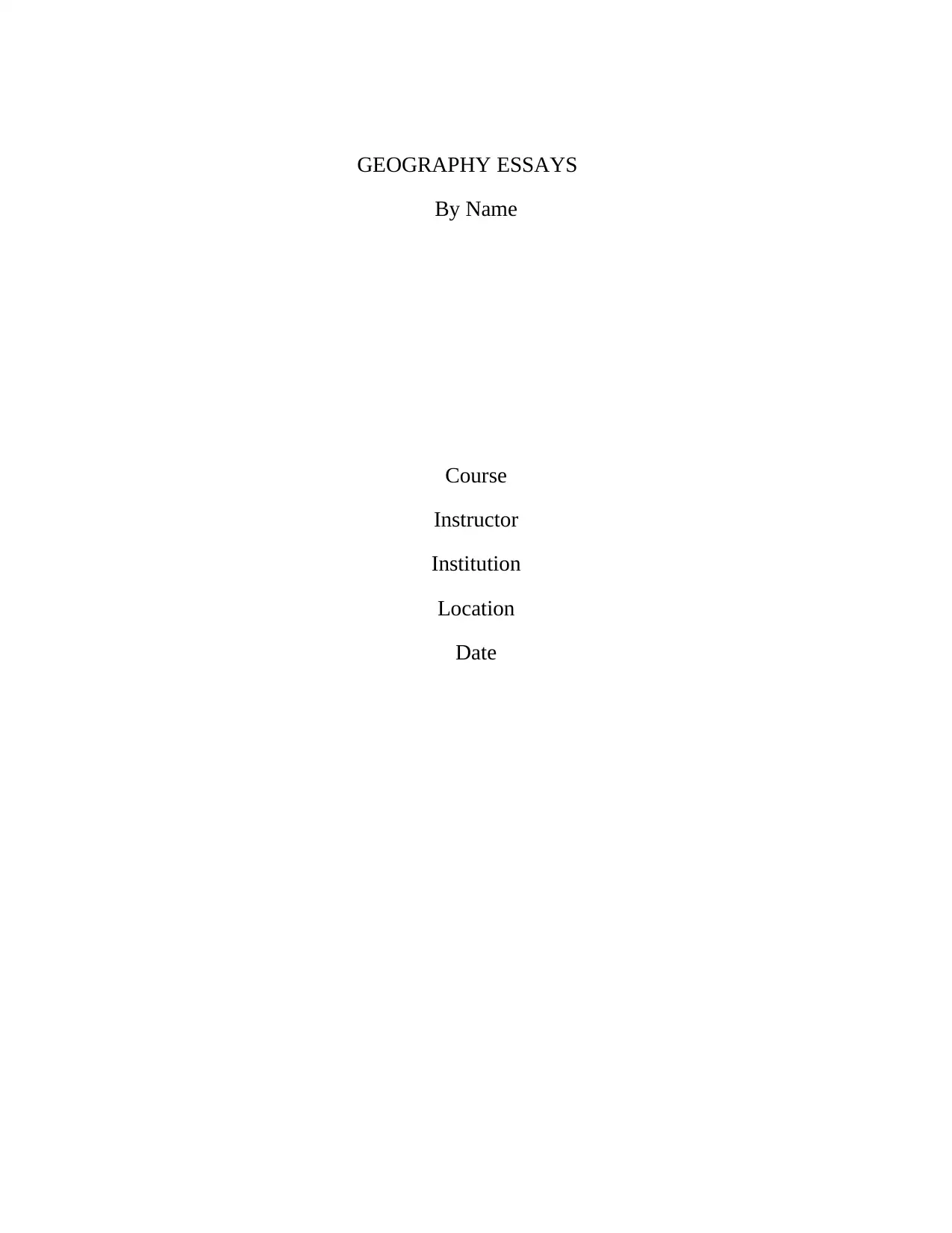
GEOGRAPHY ESSAYS
By Name
Course
Instructor
Institution
Location
Date
By Name
Course
Instructor
Institution
Location
Date
Paraphrase This Document
Need a fresh take? Get an instant paraphrase of this document with our AI Paraphraser
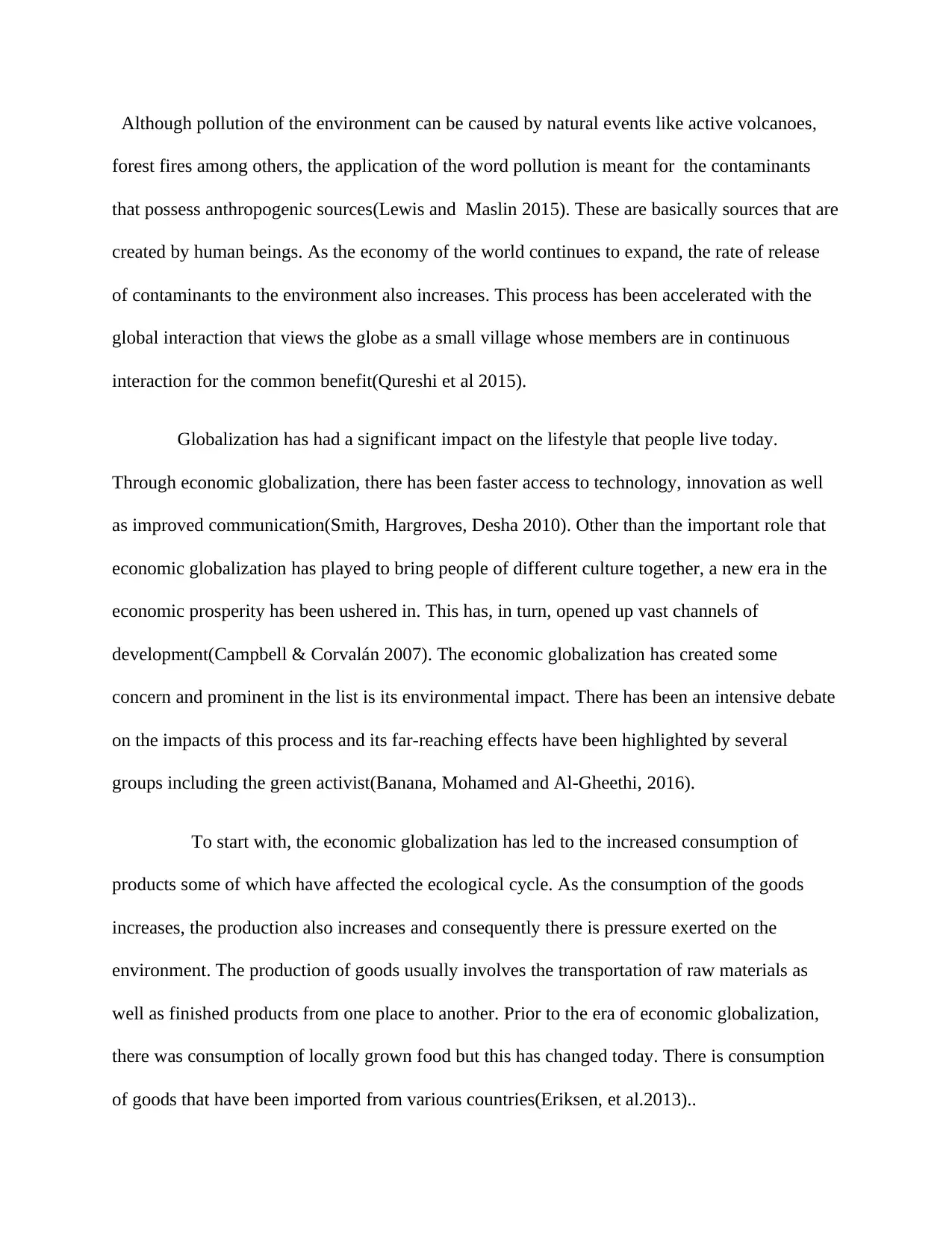
Although pollution of the environment can be caused by natural events like active volcanoes,
forest fires among others, the application of the word pollution is meant for the contaminants
that possess anthropogenic sources(Lewis and Maslin 2015). These are basically sources that are
created by human beings. As the economy of the world continues to expand, the rate of release
of contaminants to the environment also increases. This process has been accelerated with the
global interaction that views the globe as a small village whose members are in continuous
interaction for the common benefit(Qureshi et al 2015).
Globalization has had a significant impact on the lifestyle that people live today.
Through economic globalization, there has been faster access to technology, innovation as well
as improved communication(Smith, Hargroves, Desha 2010). Other than the important role that
economic globalization has played to bring people of different culture together, a new era in the
economic prosperity has been ushered in. This has, in turn, opened up vast channels of
development(Campbell & Corvalán 2007). The economic globalization has created some
concern and prominent in the list is its environmental impact. There has been an intensive debate
on the impacts of this process and its far-reaching effects have been highlighted by several
groups including the green activist(Banana, Mohamed and Al-Gheethi, 2016).
To start with, the economic globalization has led to the increased consumption of
products some of which have affected the ecological cycle. As the consumption of the goods
increases, the production also increases and consequently there is pressure exerted on the
environment. The production of goods usually involves the transportation of raw materials as
well as finished products from one place to another. Prior to the era of economic globalization,
there was consumption of locally grown food but this has changed today. There is consumption
of goods that have been imported from various countries(Eriksen, et al.2013)..
forest fires among others, the application of the word pollution is meant for the contaminants
that possess anthropogenic sources(Lewis and Maslin 2015). These are basically sources that are
created by human beings. As the economy of the world continues to expand, the rate of release
of contaminants to the environment also increases. This process has been accelerated with the
global interaction that views the globe as a small village whose members are in continuous
interaction for the common benefit(Qureshi et al 2015).
Globalization has had a significant impact on the lifestyle that people live today.
Through economic globalization, there has been faster access to technology, innovation as well
as improved communication(Smith, Hargroves, Desha 2010). Other than the important role that
economic globalization has played to bring people of different culture together, a new era in the
economic prosperity has been ushered in. This has, in turn, opened up vast channels of
development(Campbell & Corvalán 2007). The economic globalization has created some
concern and prominent in the list is its environmental impact. There has been an intensive debate
on the impacts of this process and its far-reaching effects have been highlighted by several
groups including the green activist(Banana, Mohamed and Al-Gheethi, 2016).
To start with, the economic globalization has led to the increased consumption of
products some of which have affected the ecological cycle. As the consumption of the goods
increases, the production also increases and consequently there is pressure exerted on the
environment. The production of goods usually involves the transportation of raw materials as
well as finished products from one place to another. Prior to the era of economic globalization,
there was consumption of locally grown food but this has changed today. There is consumption
of goods that have been imported from various countries(Eriksen, et al.2013)..
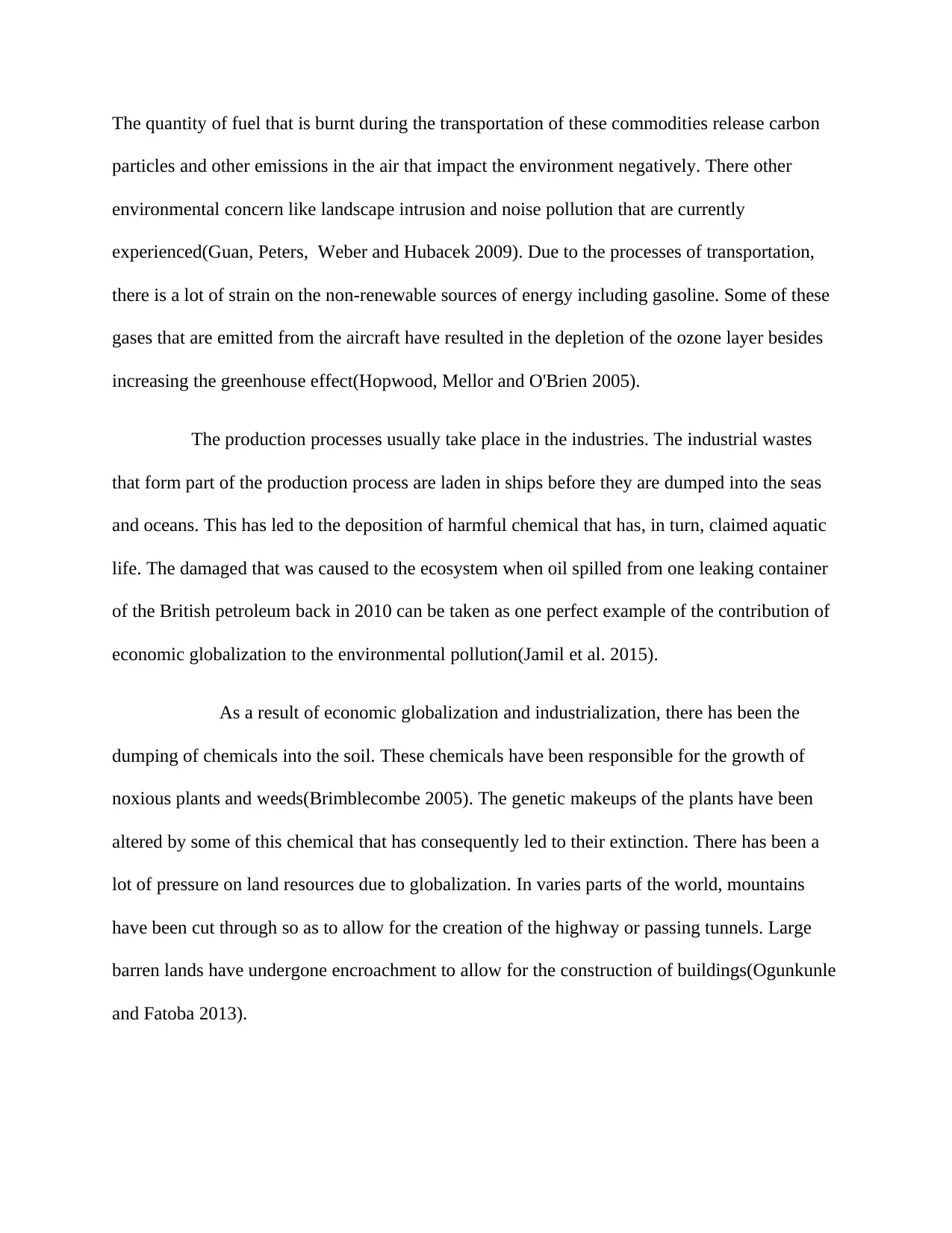
The quantity of fuel that is burnt during the transportation of these commodities release carbon
particles and other emissions in the air that impact the environment negatively. There other
environmental concern like landscape intrusion and noise pollution that are currently
experienced(Guan, Peters, Weber and Hubacek 2009). Due to the processes of transportation,
there is a lot of strain on the non-renewable sources of energy including gasoline. Some of these
gases that are emitted from the aircraft have resulted in the depletion of the ozone layer besides
increasing the greenhouse effect(Hopwood, Mellor and O'Brien 2005).
The production processes usually take place in the industries. The industrial wastes
that form part of the production process are laden in ships before they are dumped into the seas
and oceans. This has led to the deposition of harmful chemical that has, in turn, claimed aquatic
life. The damaged that was caused to the ecosystem when oil spilled from one leaking container
of the British petroleum back in 2010 can be taken as one perfect example of the contribution of
economic globalization to the environmental pollution(Jamil et al. 2015).
As a result of economic globalization and industrialization, there has been the
dumping of chemicals into the soil. These chemicals have been responsible for the growth of
noxious plants and weeds(Brimblecombe 2005). The genetic makeups of the plants have been
altered by some of this chemical that has consequently led to their extinction. There has been a
lot of pressure on land resources due to globalization. In varies parts of the world, mountains
have been cut through so as to allow for the creation of the highway or passing tunnels. Large
barren lands have undergone encroachment to allow for the construction of buildings(Ogunkunle
and Fatoba 2013).
particles and other emissions in the air that impact the environment negatively. There other
environmental concern like landscape intrusion and noise pollution that are currently
experienced(Guan, Peters, Weber and Hubacek 2009). Due to the processes of transportation,
there is a lot of strain on the non-renewable sources of energy including gasoline. Some of these
gases that are emitted from the aircraft have resulted in the depletion of the ozone layer besides
increasing the greenhouse effect(Hopwood, Mellor and O'Brien 2005).
The production processes usually take place in the industries. The industrial wastes
that form part of the production process are laden in ships before they are dumped into the seas
and oceans. This has led to the deposition of harmful chemical that has, in turn, claimed aquatic
life. The damaged that was caused to the ecosystem when oil spilled from one leaking container
of the British petroleum back in 2010 can be taken as one perfect example of the contribution of
economic globalization to the environmental pollution(Jamil et al. 2015).
As a result of economic globalization and industrialization, there has been the
dumping of chemicals into the soil. These chemicals have been responsible for the growth of
noxious plants and weeds(Brimblecombe 2005). The genetic makeups of the plants have been
altered by some of this chemical that has consequently led to their extinction. There has been a
lot of pressure on land resources due to globalization. In varies parts of the world, mountains
have been cut through so as to allow for the creation of the highway or passing tunnels. Large
barren lands have undergone encroachment to allow for the construction of buildings(Ogunkunle
and Fatoba 2013).
⊘ This is a preview!⊘
Do you want full access?
Subscribe today to unlock all pages.

Trusted by 1+ million students worldwide
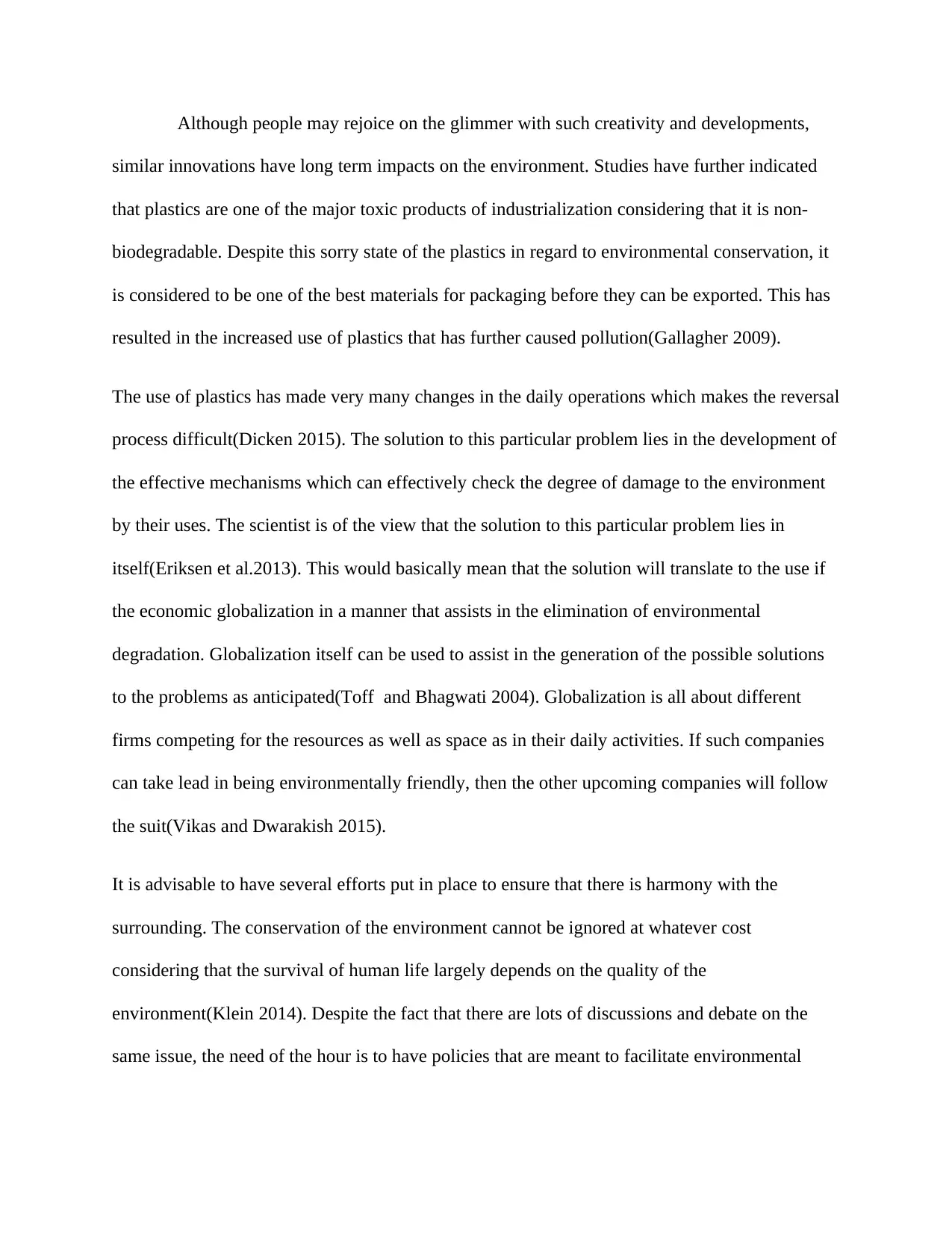
Although people may rejoice on the glimmer with such creativity and developments,
similar innovations have long term impacts on the environment. Studies have further indicated
that plastics are one of the major toxic products of industrialization considering that it is non-
biodegradable. Despite this sorry state of the plastics in regard to environmental conservation, it
is considered to be one of the best materials for packaging before they can be exported. This has
resulted in the increased use of plastics that has further caused pollution(Gallagher 2009).
The use of plastics has made very many changes in the daily operations which makes the reversal
process difficult(Dicken 2015). The solution to this particular problem lies in the development of
the effective mechanisms which can effectively check the degree of damage to the environment
by their uses. The scientist is of the view that the solution to this particular problem lies in
itself(Eriksen et al.2013). This would basically mean that the solution will translate to the use if
the economic globalization in a manner that assists in the elimination of environmental
degradation. Globalization itself can be used to assist in the generation of the possible solutions
to the problems as anticipated(Toff and Bhagwati 2004). Globalization is all about different
firms competing for the resources as well as space as in their daily activities. If such companies
can take lead in being environmentally friendly, then the other upcoming companies will follow
the suit(Vikas and Dwarakish 2015).
It is advisable to have several efforts put in place to ensure that there is harmony with the
surrounding. The conservation of the environment cannot be ignored at whatever cost
considering that the survival of human life largely depends on the quality of the
environment(Klein 2014). Despite the fact that there are lots of discussions and debate on the
same issue, the need of the hour is to have policies that are meant to facilitate environmental
similar innovations have long term impacts on the environment. Studies have further indicated
that plastics are one of the major toxic products of industrialization considering that it is non-
biodegradable. Despite this sorry state of the plastics in regard to environmental conservation, it
is considered to be one of the best materials for packaging before they can be exported. This has
resulted in the increased use of plastics that has further caused pollution(Gallagher 2009).
The use of plastics has made very many changes in the daily operations which makes the reversal
process difficult(Dicken 2015). The solution to this particular problem lies in the development of
the effective mechanisms which can effectively check the degree of damage to the environment
by their uses. The scientist is of the view that the solution to this particular problem lies in
itself(Eriksen et al.2013). This would basically mean that the solution will translate to the use if
the economic globalization in a manner that assists in the elimination of environmental
degradation. Globalization itself can be used to assist in the generation of the possible solutions
to the problems as anticipated(Toff and Bhagwati 2004). Globalization is all about different
firms competing for the resources as well as space as in their daily activities. If such companies
can take lead in being environmentally friendly, then the other upcoming companies will follow
the suit(Vikas and Dwarakish 2015).
It is advisable to have several efforts put in place to ensure that there is harmony with the
surrounding. The conservation of the environment cannot be ignored at whatever cost
considering that the survival of human life largely depends on the quality of the
environment(Klein 2014). Despite the fact that there are lots of discussions and debate on the
same issue, the need of the hour is to have policies that are meant to facilitate environmental
Paraphrase This Document
Need a fresh take? Get an instant paraphrase of this document with our AI Paraphraser
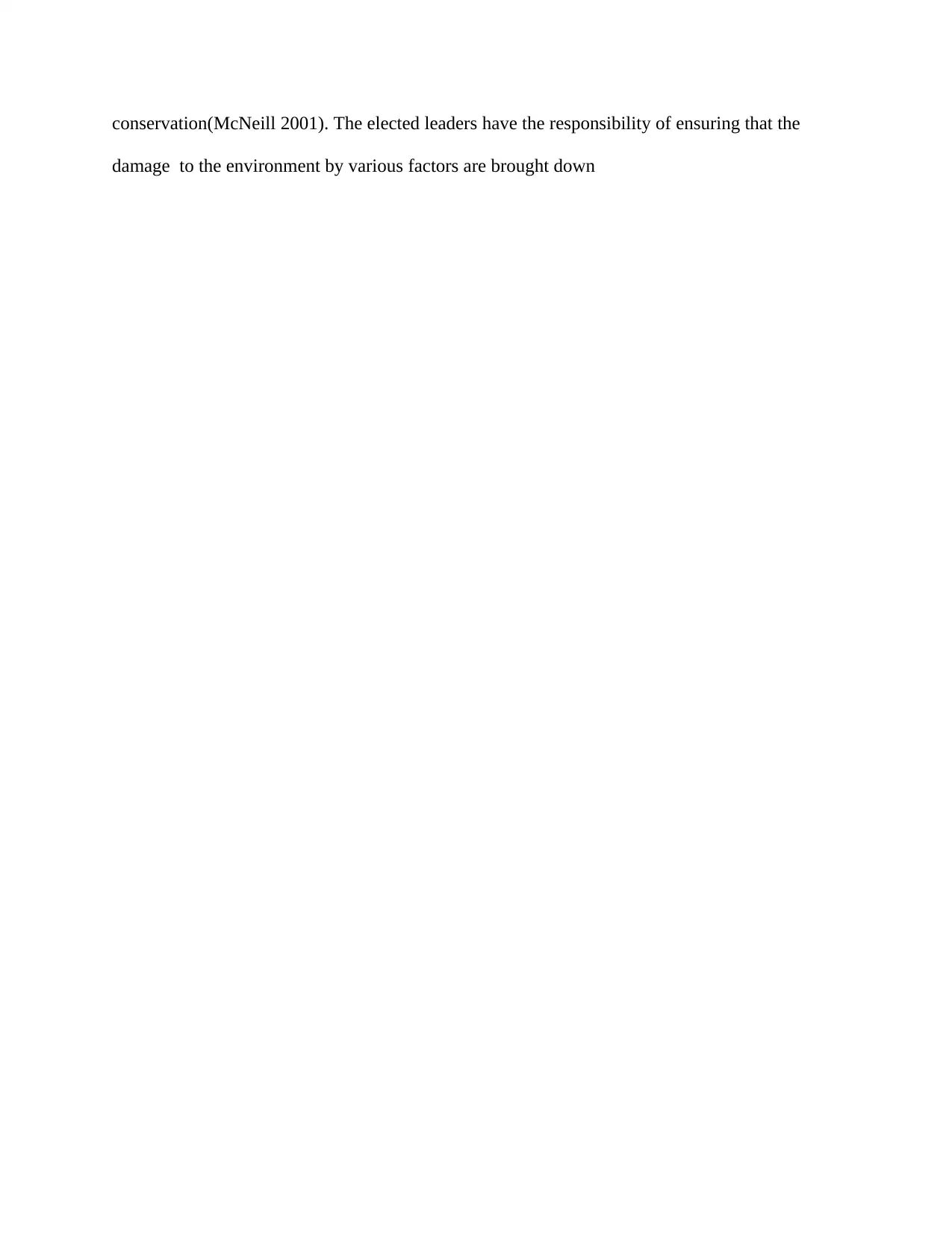
conservation(McNeill 2001). The elected leaders have the responsibility of ensuring that the
damage to the environment by various factors are brought down
damage to the environment by various factors are brought down
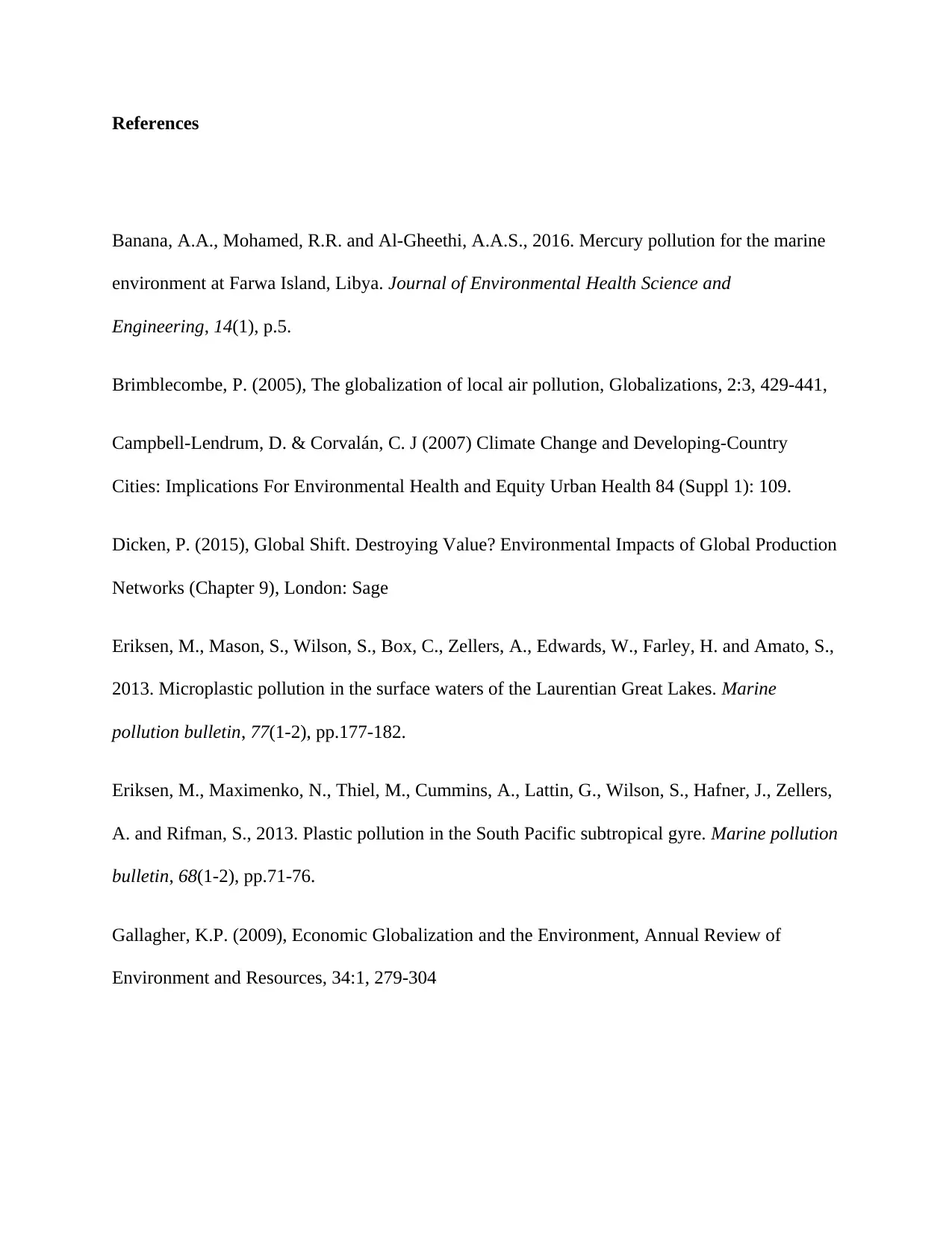
References
Banana, A.A., Mohamed, R.R. and Al-Gheethi, A.A.S., 2016. Mercury pollution for the marine
environment at Farwa Island, Libya. Journal of Environmental Health Science and
Engineering, 14(1), p.5.
Brimblecombe, P. (2005), The globalization of local air pollution, Globalizations, 2:3, 429-441,
Campbell-Lendrum, D. & Corvalán, C. J (2007) Climate Change and Developing-Country
Cities: Implications For Environmental Health and Equity Urban Health 84 (Suppl 1): 109.
Dicken, P. (2015), Global Shift. Destroying Value? Environmental Impacts of Global Production
Networks (Chapter 9), London: Sage
Eriksen, M., Mason, S., Wilson, S., Box, C., Zellers, A., Edwards, W., Farley, H. and Amato, S.,
2013. Microplastic pollution in the surface waters of the Laurentian Great Lakes. Marine
pollution bulletin, 77(1-2), pp.177-182.
Eriksen, M., Maximenko, N., Thiel, M., Cummins, A., Lattin, G., Wilson, S., Hafner, J., Zellers,
A. and Rifman, S., 2013. Plastic pollution in the South Pacific subtropical gyre. Marine pollution
bulletin, 68(1-2), pp.71-76.
Gallagher, K.P. (2009), Economic Globalization and the Environment, Annual Review of
Environment and Resources, 34:1, 279-304
Banana, A.A., Mohamed, R.R. and Al-Gheethi, A.A.S., 2016. Mercury pollution for the marine
environment at Farwa Island, Libya. Journal of Environmental Health Science and
Engineering, 14(1), p.5.
Brimblecombe, P. (2005), The globalization of local air pollution, Globalizations, 2:3, 429-441,
Campbell-Lendrum, D. & Corvalán, C. J (2007) Climate Change and Developing-Country
Cities: Implications For Environmental Health and Equity Urban Health 84 (Suppl 1): 109.
Dicken, P. (2015), Global Shift. Destroying Value? Environmental Impacts of Global Production
Networks (Chapter 9), London: Sage
Eriksen, M., Mason, S., Wilson, S., Box, C., Zellers, A., Edwards, W., Farley, H. and Amato, S.,
2013. Microplastic pollution in the surface waters of the Laurentian Great Lakes. Marine
pollution bulletin, 77(1-2), pp.177-182.
Eriksen, M., Maximenko, N., Thiel, M., Cummins, A., Lattin, G., Wilson, S., Hafner, J., Zellers,
A. and Rifman, S., 2013. Plastic pollution in the South Pacific subtropical gyre. Marine pollution
bulletin, 68(1-2), pp.71-76.
Gallagher, K.P. (2009), Economic Globalization and the Environment, Annual Review of
Environment and Resources, 34:1, 279-304
⊘ This is a preview!⊘
Do you want full access?
Subscribe today to unlock all pages.

Trusted by 1+ million students worldwide
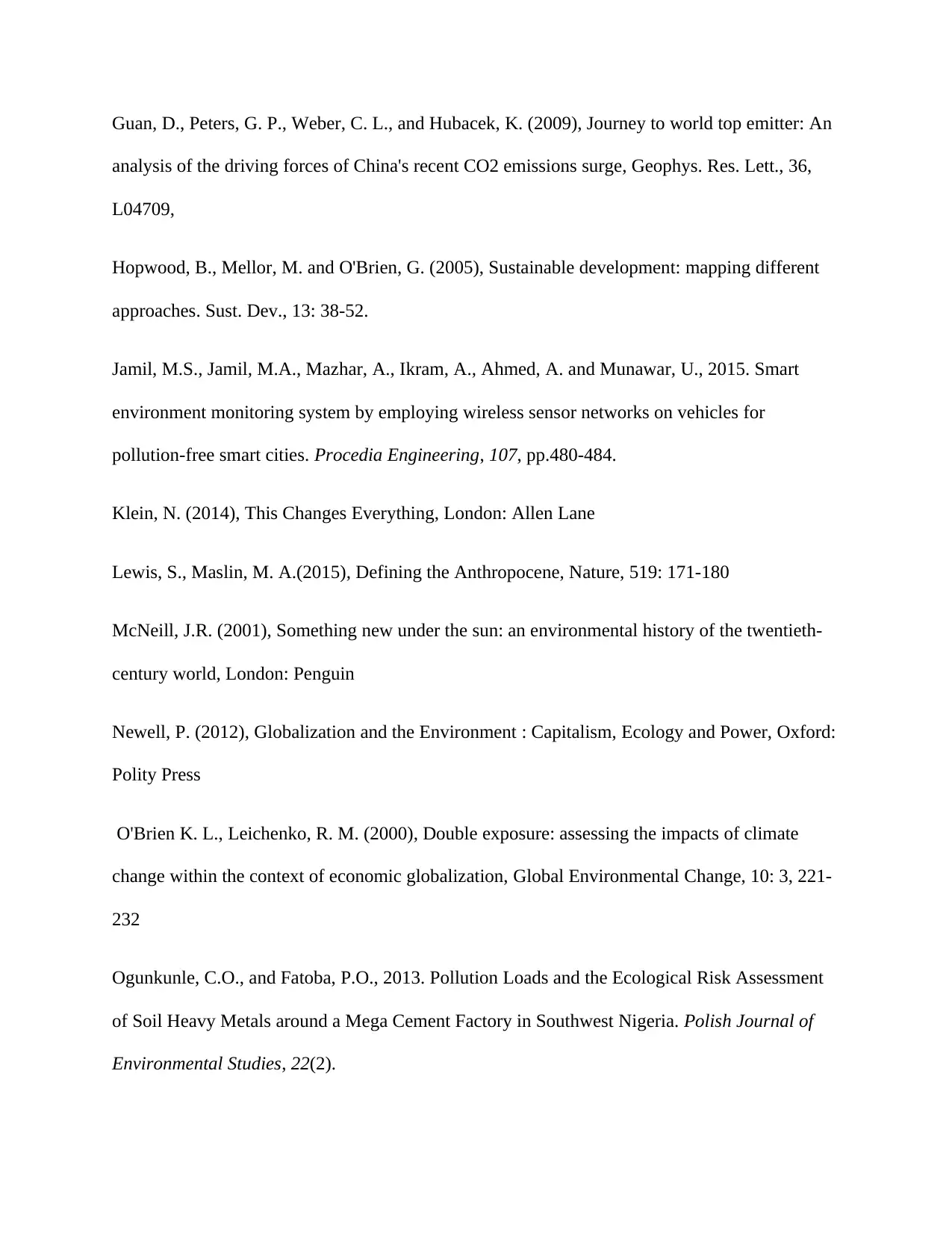
Guan, D., Peters, G. P., Weber, C. L., and Hubacek, K. (2009), Journey to world top emitter: An
analysis of the driving forces of China's recent CO2 emissions surge, Geophys. Res. Lett., 36,
L04709,
Hopwood, B., Mellor, M. and O'Brien, G. (2005), Sustainable development: mapping different
approaches. Sust. Dev., 13: 38-52.
Jamil, M.S., Jamil, M.A., Mazhar, A., Ikram, A., Ahmed, A. and Munawar, U., 2015. Smart
environment monitoring system by employing wireless sensor networks on vehicles for
pollution-free smart cities. Procedia Engineering, 107, pp.480-484.
Klein, N. (2014), This Changes Everything, London: Allen Lane
Lewis, S., Maslin, M. A.(2015), Defining the Anthropocene, Nature, 519: 171-180
McNeill, J.R. (2001), Something new under the sun: an environmental history of the twentieth-
century world, London: Penguin
Newell, P. (2012), Globalization and the Environment : Capitalism, Ecology and Power, Oxford:
Polity Press
O'Brien K. L., Leichenko, R. M. (2000), Double exposure: assessing the impacts of climate
change within the context of economic globalization, Global Environmental Change, 10: 3, 221-
232
Ogunkunle, C.O., and Fatoba, P.O., 2013. Pollution Loads and the Ecological Risk Assessment
of Soil Heavy Metals around a Mega Cement Factory in Southwest Nigeria. Polish Journal of
Environmental Studies, 22(2).
analysis of the driving forces of China's recent CO2 emissions surge, Geophys. Res. Lett., 36,
L04709,
Hopwood, B., Mellor, M. and O'Brien, G. (2005), Sustainable development: mapping different
approaches. Sust. Dev., 13: 38-52.
Jamil, M.S., Jamil, M.A., Mazhar, A., Ikram, A., Ahmed, A. and Munawar, U., 2015. Smart
environment monitoring system by employing wireless sensor networks on vehicles for
pollution-free smart cities. Procedia Engineering, 107, pp.480-484.
Klein, N. (2014), This Changes Everything, London: Allen Lane
Lewis, S., Maslin, M. A.(2015), Defining the Anthropocene, Nature, 519: 171-180
McNeill, J.R. (2001), Something new under the sun: an environmental history of the twentieth-
century world, London: Penguin
Newell, P. (2012), Globalization and the Environment : Capitalism, Ecology and Power, Oxford:
Polity Press
O'Brien K. L., Leichenko, R. M. (2000), Double exposure: assessing the impacts of climate
change within the context of economic globalization, Global Environmental Change, 10: 3, 221-
232
Ogunkunle, C.O., and Fatoba, P.O., 2013. Pollution Loads and the Ecological Risk Assessment
of Soil Heavy Metals around a Mega Cement Factory in Southwest Nigeria. Polish Journal of
Environmental Studies, 22(2).
Paraphrase This Document
Need a fresh take? Get an instant paraphrase of this document with our AI Paraphraser
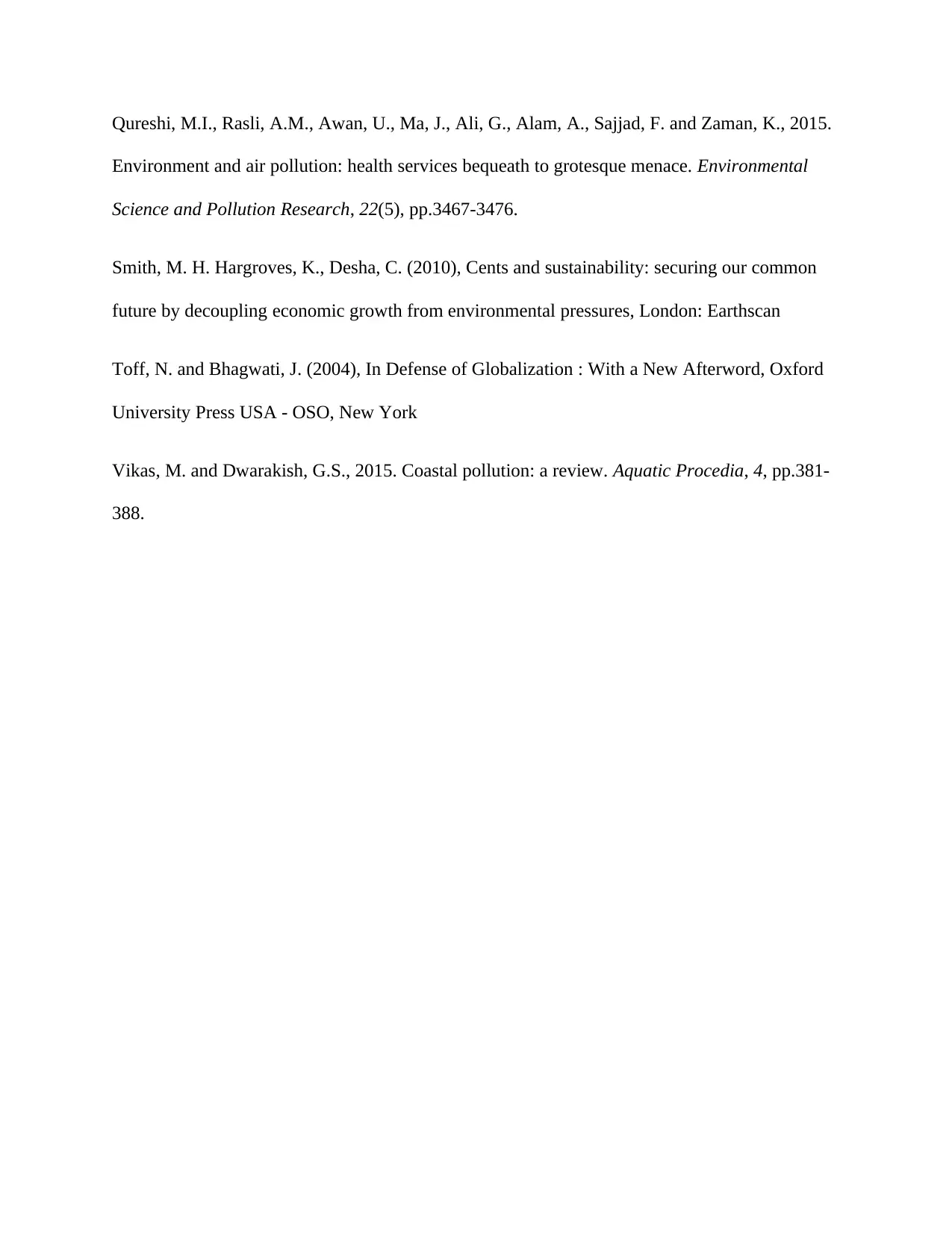
Qureshi, M.I., Rasli, A.M., Awan, U., Ma, J., Ali, G., Alam, A., Sajjad, F. and Zaman, K., 2015.
Environment and air pollution: health services bequeath to grotesque menace. Environmental
Science and Pollution Research, 22(5), pp.3467-3476.
Smith, M. H. Hargroves, K., Desha, C. (2010), Cents and sustainability: securing our common
future by decoupling economic growth from environmental pressures, London: Earthscan
Toff, N. and Bhagwati, J. (2004), In Defense of Globalization : With a New Afterword, Oxford
University Press USA - OSO, New York
Vikas, M. and Dwarakish, G.S., 2015. Coastal pollution: a review. Aquatic Procedia, 4, pp.381-
388.
Environment and air pollution: health services bequeath to grotesque menace. Environmental
Science and Pollution Research, 22(5), pp.3467-3476.
Smith, M. H. Hargroves, K., Desha, C. (2010), Cents and sustainability: securing our common
future by decoupling economic growth from environmental pressures, London: Earthscan
Toff, N. and Bhagwati, J. (2004), In Defense of Globalization : With a New Afterword, Oxford
University Press USA - OSO, New York
Vikas, M. and Dwarakish, G.S., 2015. Coastal pollution: a review. Aquatic Procedia, 4, pp.381-
388.
1 out of 8
Related Documents
Your All-in-One AI-Powered Toolkit for Academic Success.
+13062052269
info@desklib.com
Available 24*7 on WhatsApp / Email
![[object Object]](/_next/static/media/star-bottom.7253800d.svg)
Unlock your academic potential
Copyright © 2020–2026 A2Z Services. All Rights Reserved. Developed and managed by ZUCOL.





